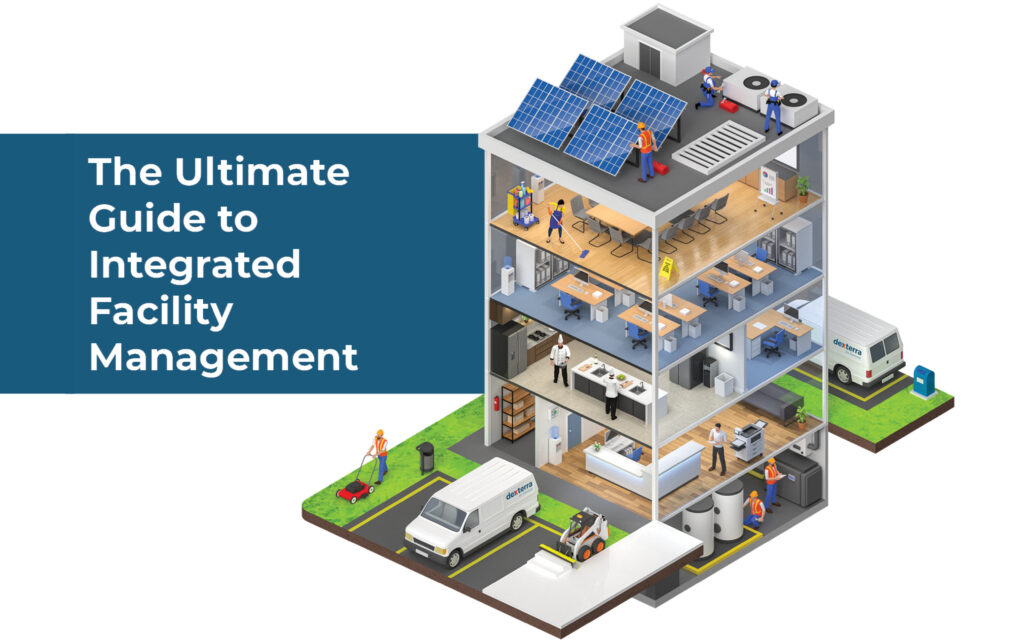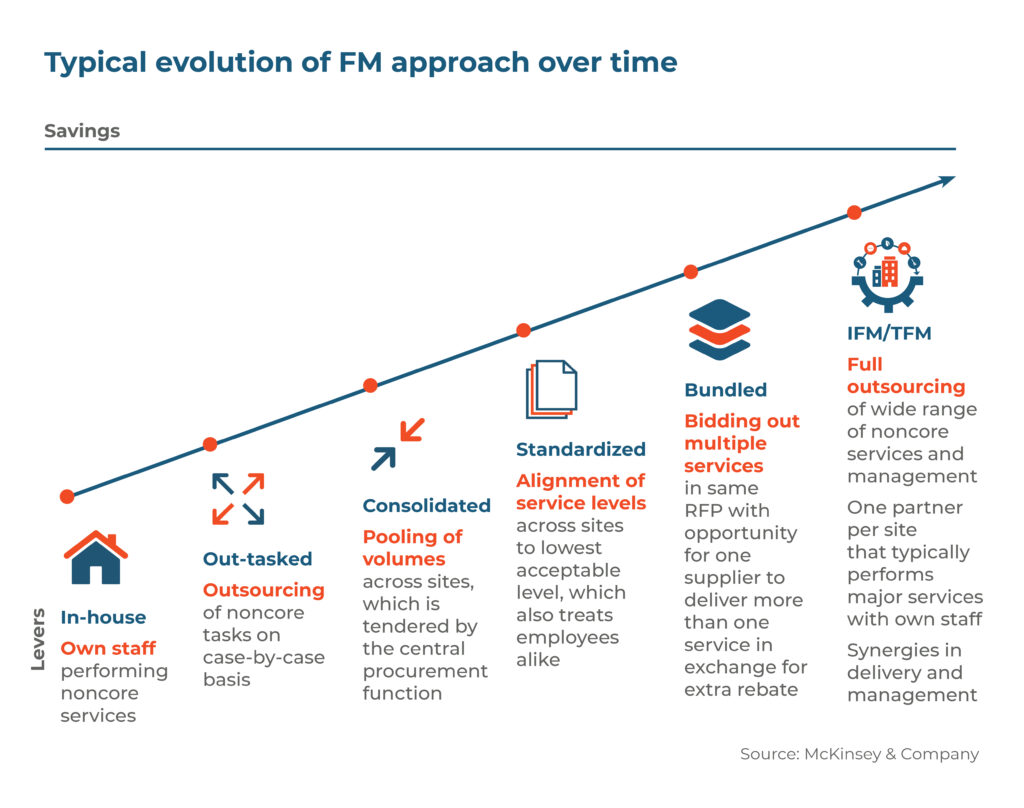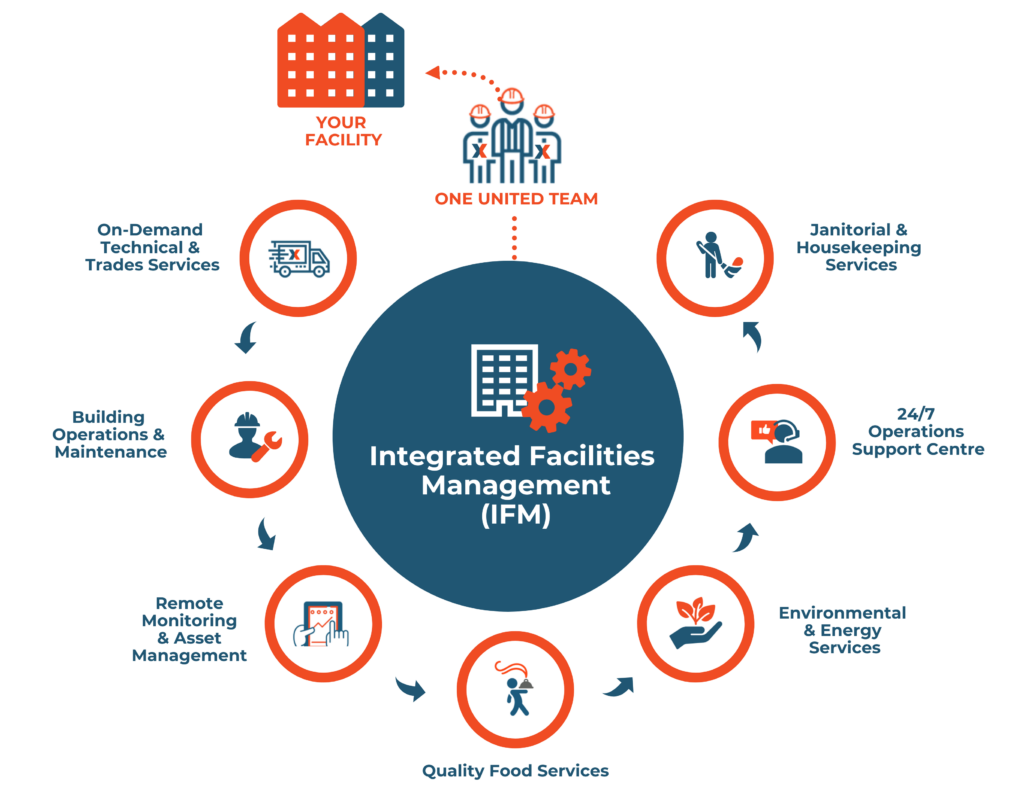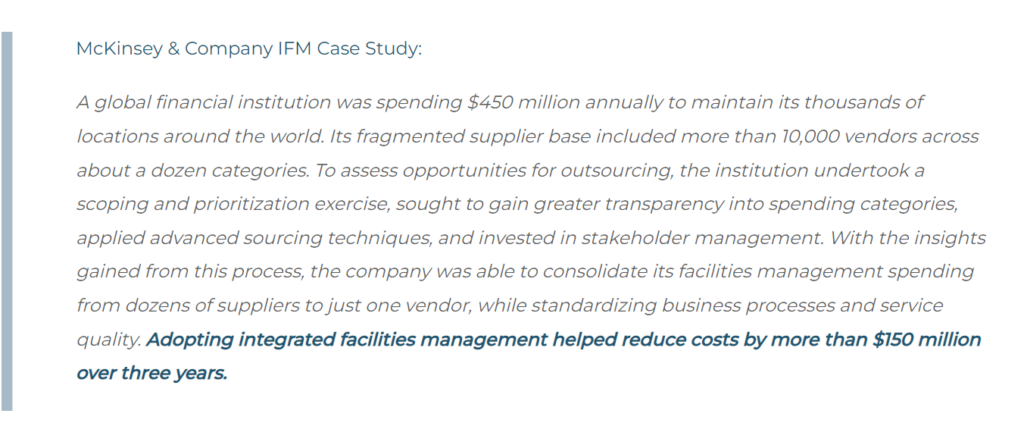

Here is a comprehensive guide of everything you need to know about Integrated Facility Management (IFM). No matter the industry, most businesses require facilities management in some form. Although many are familiar with “FM”, the term “IFM” doesn’t seem to harbour the same familiarity.
Facility Management (FM): is the individual tools and services that support the functionality, safety, and sustainability of buildings, grounds, infrastructure, and real estate.
Typically, FM services are broken down by hard and soft services:

Hard FM Services
These services pertain directly to the building itself. They’re inseparable from the building and are typically considered capital expenditures.

Soft FM Services
Unlike hard services, which are built into the property, soft services augment it. These services primarily improve the wellbeing of the people within the facilities and allow them to make the most of their time in them.
When you introduce integrated facility management services it’s a smart way of consolidating hard and soft services or combining them under one service level agreement (SLA). It can also help you achieve and maintain sustainable and innovative facilities, like healthy buildings and smart buildings.
Integrated Facility Management (IFM): in a nutshell, the IFM approach consolidates all the FM efforts under one united team – a team that is integrated and performs the work collaboratively – as opposed to managing multiple vendors and contractors, you have one dedicated facility partner.
For example, instead of separate plumbing and HVAC/R providers, a facility manager may award a single contract to a company that handles both. Alternatively, they might fold a broad scope of hard and soft services into a single property management contract that saves money without compromising service. Integrated facilities management offers more opportunities for service-level agreement management, which can lead to vendor simplification, cost savings, and enhanced results.

Single Service
Each FM service is outsourced to a separate provider

Bundled Services
These services pertain directly to the building itself. They’re inseparable from the building and are typically considered capital expenditures

Real Estate Aggregate Model (REAM)
This model typically has a management company as the client point of contact and then they outsource individual FM services to various contractors
IFM differs from these other models because the integrated approach focuses on the tactical and strategic level, using integration and real data to drive more efficient operations. The service delivery teams are cohesive and integrated.

The integrated approach provides a holistic view of all the moving parts, which means you can make more informed decisions at every level, resulting in a variety of operational cost-saving opportunities. Areas where you’re overspending, being wasteful or inefficient, or gaps in budgeting are easy to identify and quicker to rectify.
A total integrated facility management offering includes the following components:

Taking an integrated approach to managing your facility means fewer contracts, teams, and resources to juggle, as well as a bird’s-eye view of all facility management-related tasks. Having an expert team take care of your facility management tasks means your team can focus on core strategic priorities that will move your business forward.
When you leverage the power of a single, self-delivering provider through IFM, the incremental improvements can be endlessly accumulated and compounded. but what are the real benefits that you can be certain of when you make the switch to an integrated approach?

Adopt Predictive Analytics and Internet of Things

Manage Your Team Structure

Make Decisions Using Real-Time Data

Ensure Analytics are C-Suite Focused

Emphasize Technological Investments

Use the Power of Analytics

Make Mobile Accessible

Negotiate Your Service Provider’s Rates

Create an Inventory of Assets

Impose Vendor Check-In/Out
With an ever-evolving society and the digitization of many processes in the field of business, facility managers will find that the incorporation of new technologies, as well as leveraging data, will serve them well in the long-run.
Partnering with an experienced, collaborative integrated facility management service provider can improve productivity and more importantly reduce costs. According to McKinsey & Company, using an IFM partner can reduce FM costs by up to 15%. Let’s break down the pros of outsourcing your FM services.
PROS:

Broader Expertise
Because outsourced facility management companies are specialty service providers, you’ll avoid the hassle of recruiting and hiring an internal employee or team with the right skill sets. FM providers tackle the job from day one. Your biggest task is educating the vendor on your company culture, employee needs, and physical building quirks.

Flexibility
An outsourced FM vendor puts attention where you need it most, while also managing general facility needs. They have the resources to handle facility expansions and improvements at the same as keeping systems running and making needed fixes. Outsource vendors can scale much faster and easier than a single facilities manager.

Cost Savings
One of the biggest positives about outsourcing—and an overall critical focus—is cost savings. Generally, the fees you’ll end up paying to an outsourced facilities management company are less than the salary of an in-house employee. The long-term benefits are clear when coupled with savings on training, ongoing education, employee benefits, and other overhead.
How can you determine what the best solution is for you? Here are some criteria questions to consider when you’re ready to choose the right solution for your needs:
Is IFM right for you? The answer is yes if you:
Typically, IFM solutions are procured through a Request for Proposals (RFP) process. It is essential to be prepared and document information on the current state of your facility, any planned changes, and any anticipated facility needs. This will ensure that you are aligned with the IFM solution that will best fit your needs and bring you the most value over the long term.
Whether you’re evaluating a current FM relationship or exploring new integrated facility management companies, finding the right partner is key. Partnering with an IFM provider is a significant step towards bringing your larger organization goals and your FM program into alignment. Your service provider should have a thorough understanding of your core business and how to add strategic value to your organization.

IFM can revolutionize your facilities management efforts by saving you time, money, and other precious resources. But moving to integrated facilities management isn’t like flipping a switch – it will take time.
Here are a few steps you can take to get started:

Do Your Homework
Perform a thorough analysis of how existing office-based solutions are used within your organization. Look for inefficiencies, overlap, and opportunities to improve your employee experience.

Identify and Align Your Goals
Take time to determine your goals, how they align with broader organizational objectives, and how you’ll measure your performance.

Communicate Consistently
Successfully transitioning to IFM is an exercise in project management. Use feedback surveys, host small group discussions, leverage internal advocates, and ensure people feel they can come to you with any questions or concerns.
![]()
Consider Outsourcing Integrated Facilities Management Services
Outsourcing can improve efficiency, reduce costs and give you access to more innovative technologies and processes. Do your research and look for a provider that can be a strategic facility partner to you.
Moving to an integrated facility management approach can mean significant changes to your facility operations. By accounting for the learning curve and preparing a strategy ahead of time you can eliminate issues that may slow your progress.
There are several facility management professional organizations that govern the FM industry and are excellent resources to learn more about the field and stay up to date with the industry. These include the following:
Are you ready to benefit from an integrated facility approach? Let’s chat!